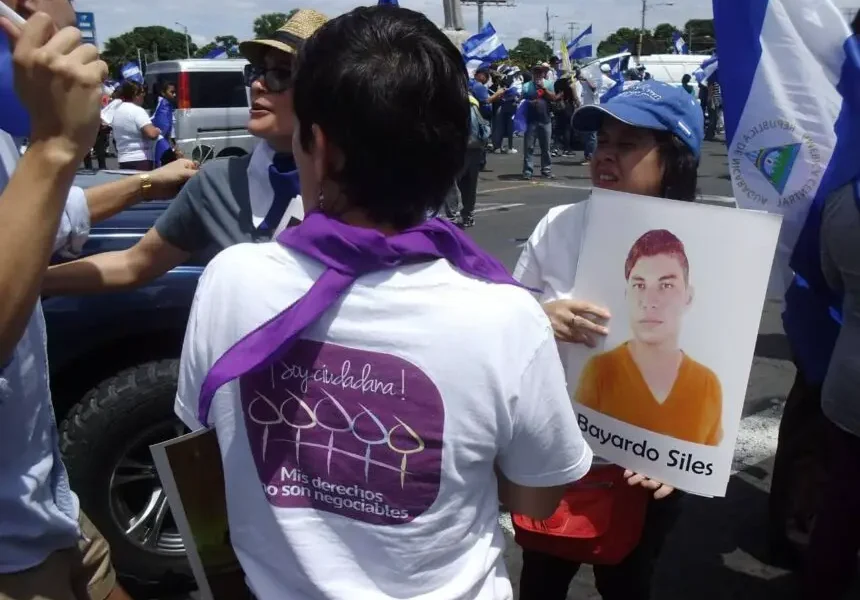Bayardo Siles
When circumstances of abuse arise, the bodies are hurt and the psyche is altered. Victims of sexual violence are used as a weapon of war by the oppressors to intimidate opposition groups that peacefully protest against economic projects and political plans.
As Amnesty International explains, sexual violence has been perpetrated as a final act of humiliation to the defeated opponent, sometimes as a strategy of terror imposed on civilian populations to create greater chaos in the midst of a conflict. And he adds that this form of violence “can affect men, women, girls, boys and/or adolescents.”
Ortega’s presence in power meant a progressive dismantling of democratic institutions and the rule of law. This has caused higher rates of social protests. Within those ranks of the resistance we are LGBTIQ+ activists, who were captured and subjected to sexual violence against our bodies and minds. They forced us to undress, we suffered touching, among other sexual assaults. All of this occurred in the well-known “El Chipote” Judicial Aid, a prison designated for the recruitment of political prisoners in Managua, the capital of Nicaragua.
The sociopolitical crisis that Nicaragua has been experiencing since 2018 already shows cases of sexual violence as a crime against humanity under the authoritarian regime. The only experience known to date includes 18 testimonies from victims of sexual violence who remained arbitrarily detained by official State officials. To this reality, my testimony in the media is also added, which has the respective complaint in international justice organizations (Univisión 23, 2018).
This painful reality was reflected in the Report that the Arias Foundation for Peace and Human Progress of Costa Rica worked on, in 2018. Precisely, that year there was a wave of Nicaraguans to Costa Rican territory seeking protection as a result of a new episode of repression. The Foundation, by collecting the testimonies, was able to demonstrate the cases of sexual violence. When carrying out the psychosocial expert opinion, it concludes that, for the victims, torture and sexual torture are not events that are found in the past, but are updated through traumatic re-experiencing, producing current suffering, which affects all areas. of their life.
In these efforts to continue to stand up against injustice, I see that there are also challenges when victims of sexual abuse return to the organizing ranks of activism. In many cases, they say that they live in exclusive and violent situations, a fact that generates internal divisions, rivalries and conflicts. This is due to the fact that the organizations do not have sufficient psychological support or that there is little empathy from the colleagues of the organizational group to care for the victims.
For this and other reasons, all activists and human rights defenders must responsibly analyze the actions of accompaniment and care that help to heal those who have been victims of sexual violence. These people face constant challenges, for example, the absence of restorative justice, slow and bureaucratic judicial processes, as well as the lack of financial resources. What the people who have been violated least expect is to also be victimized by the abandonment of their own organizations in their demands before the international community for crimes against humanity.
Considering these realities, the planning of nonviolent resistance actions in a comprehensive manner must take into account the risks and have a transversal axis in the psychosocial aspect. Victims of sexual torture face the great challenge of maintaining the vision and mission of peaceful protest, even when their wounds and memories have not yet been healed. So, by not accompanying or caring for them, there is a risk of losing allies to the purposes of peaceful resistance. In fact, feelings of abandonment and disloyalty weaken the advocacy plans of groups that are committed to nonviolent resistance, which can even give rise to the emergence of new protagonists of future dictatorships, lacking a strengthened opposition.
By way of conclusion, I want to offer the following reflections:
- Comprehensive care for victims of sexual abuse is talking about Human Rights.
- Within mobilization and resistance groups there is also a culture of silence and stigma around sexual abuse. This acts in two ways: by social censorship, which questions the credibility of the abuses out of fear and jealousy of the leadership that surrounds a victim of sexual abuse and torture; and out of shame and self-censorship to prevent the victim from ending up excluded from the organization. Both mechanisms contribute to impunity.
- Not scheduling containment actions, accompaniment, psychological aid, or managing resources for the adequate care of members of organizations that have suffered abuse and/or sexual violence, sends a dangerous message about the validity of torture as a mechanism to obtain confessions.
- Within organizations, any form of exclusion of victims of sexual violence, whether carried out by men or women, is a patriarchal demonstration of hegemonic masculinity.
Finally, I think it is necessary to indicate that a comprehensive reparation also crosses by not using our bodies and lives so that certain organizations only seek financing and then forget us when the projects are finished. I call for ethics and responsibility.
Let’s take the step to action. nonviolent action.
*Bayardo Siles
LGBTIQ+ activist from Nicaragua, survivor of sexual torture and political prisoner released from the dictatorship of Daniel Ortega and Rosario Murillo. Student expelled from the Social Work career at the National Autonomous University of Nicaragua. Currently, exiled in Costa Rica.
Translated by Damian Vazquez



